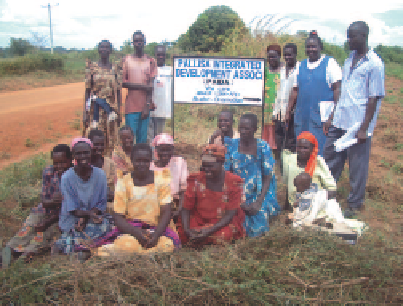Agriculture Reference
In-Depth Information
E) Tangible outputs, impact and experiences of the project
Joint problem diagnosis during the FFS platforms brought Government and non-
governmental organizations together to define priority problems and opportunities
for research & extension. It has
provided a strong foundation for
on-going co-operation and learning
for change. Through the FFS plat-
forms, farmers and the consortium
organizations have had opportunity
to better understand and appreciate
the Indigenous Knowledge avai-
lable with the farmers and build
upon it as a knowledge base for
continuing future innovative work.
Initial results of the impact assess-
ment exercise show that although
50% of the farmers were already
experimenting prior to joining the FFS, one year after all members engaged in experi-
mentation and had significantly improved the process (using control comparisons,
detailed observation, more structured evaluation on multiple aspects etc.) The FFS
platforms have bridged the gap between agricultural extensionists, and the farmers
as it has provided a forum and the means by which agricultural extension agents
have been more closely in contact with farmers on a fortnightly basis. The FFS
process has fostered cohesiveness and sustainability of the groups and for future
activities. At the FFS platform level, community structures were created to facilitate
the ongoing project activities, but also resulted in a number of commercial activities
such as vegetable production and marketing and milk processing. One year after the
closing of the FFS facilitation process all FFS groups were still active, but the focus
shifted to joint implementation of commercial activities. The FFS appears to be an
excellent approach to link smallholders to national, regional and even international
markets. The FFS approach is gaining momentum in East Africa in a broad range of
research and development organizations and is already implemented to address a
wide array of rural livelihood challenges.
The project resulted in a series of publications and seminar presentations, 4 students
(2 MSc and 2 PhD in Uganda and Kenya) participated in the projects and through
national and regional networks the projects actively contributed to the upscaling and
institutionalization debate around FFS in the East African region.
Summary
The Integrated Nutrient Management Project (INMASP) was initiated in December
2001 to reverse declining trends of soil fertility and to make a sustainable
contribution to the livelihoods of small-scale farmers in East Africa (Kenya, Uganda
and Ethiopia). Stakeholders recognized that in the face of increasing population
pressure and shrinking land sizes, approaches and remedies are required that may

Search WWH ::

Custom Search